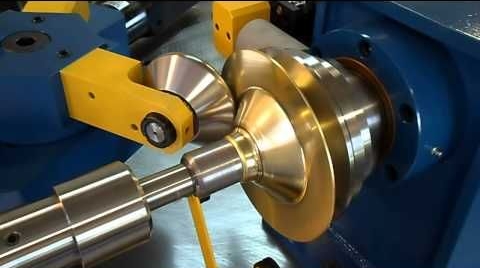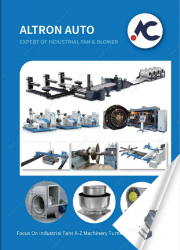Comprehensive Guide: What is the Metal Spinning Process?
Metal spinning is a versatile and efficient metal-forming process that has been employed for centuries to create various cylindrical or conical shapes. This blog will delve into the intricacies of the metal spinning process, shedding light on its applications, requirements, and the expertise offered by ALTRON, a leading manufacturer in the field of metal forming.
1. What is the Metal Spinning Process?
What is the metal spinning process? The metal spinning process, also known as spin forming or metal turning, is a metalworking technique used to shape a flat metal disc or tube into a desired shape. It is a cold-forming process that utilizes the application of force to reshape the metal without the need for excessive heat or cutting.
The process involves mounting a metal blank, which can be a flat sheet or a pre-formed tube, onto a rotating mandrel or chuck. The mandrel or chuck spins at high speeds while various tools, such as rollers, presses, or hand-held tools, are used to apply pressure and shape the metal against the mandrel. As the metal blank rotates, the pressure exerted by the tools causes the metal to flow and conform to the shape of the mandrel. The spinning tools can be used to create different forms, such as cylindrical shapes, cones, hemispheres, or more complex contours.
Metal spinning offers several advantages over other metal-forming processes. It allows for the production of seamless, symmetrical shapes with high precision and smooth finishes. It is a relatively quick and cost-effective method, as it requires minimal tooling and setup compared to techniques like casting or forging. Metal spinning is commonly used in industries such as aerospace, automotive, lighting, decorative arts, and the manufacturing of various metal components.
2. The Benefits of Metal Spinning: What is the Metal Spinning Process?
2.1 Versatility and Customization:
One of the primary advantages of metal spinning is its versatility in creating a diverse range of shapes, sizes, and thicknesses. The process allows for customized solutions, making it suitable for various industries such as automotive, aerospace, lighting, and architecture.
2.2 Cost-effectiveness:
Metal spinning offers cost advantages compared to alternative metal forming methods. It requires minimal tooling and setup costs, making it an attractive choice for both prototype development and large-scale production. Additionally, the absence of complex dies or molds reduces lead times and allows for quicker turnaround.
2.3 Seamless and Uniform Shapes:
Metal spinning produces seamless, monolithic shapes without the need for welding or joining processes. This eliminates potential weak points in the final product, resulting in enhanced structural integrity. Furthermore, the spinning process ensures uniform wall thickness, contributing to the overall aesthetics and functionality of the finished component.
3. The Metal Spinning Process: What is the Metal Spinning Process?
3.1 Material Preparation:
The metal spinning process begins with the selection of a suitable metal blank. The blank is typically a flat disc or sheet with the required diameter and thickness. The material may undergo pre-forming treatments such as annealing or heat treatment to enhance its formability.

3.2 Set-up and Tooling:
The metal blank is clamped onto a spinning lathe or spinning machine, which rotates it at high speeds. Various tooling options, including molds, mandrels, and rollers, are employed to shape the material. These tools apply controlled pressure to deform the metal gradually and achieve the desired form.
3.3 Spinning and Forming:
The skilled metal spinner, guided by experience and expertise, uses hand or machine-based techniques to shape the rotating metal blank. By applying pressure with specialized tools, such as spinning rollers or hand-held spoons, the metal gradually stretches and forms into the desired shape.
3.4 Finishing Touches:
Once the spinning process is complete, any excess material is trimmed, and additional finishing steps can be performed. These may include polishing, buffing, or surface treatments to enhance the aesthetics, functionality, and corrosion resistance of the final product.
4. ALTRON: Your Metal Spinning Partner:
ALTRON, a renowned manufacturer in the field of metal forming, offers comprehensive and customized solutions for metal spinning requirements. With a team of skilled engineers and technicians, ALTRON caters to various industries, including industrial fans, by providing advanced technology, equipment, and expertise. Their customer-centric approach ensures efficient production processes and high-quality results.
4.1 Comprehensive Customized Solutions
When it comes to metal forming, ALTRON stands out for its ability to provide comprehensive and customized solutions. The team of experienced engineers at ALTRON is well-versed in a range of metal forming techniques and is equipped to handle various project requirements. Whether it’s metal spinning, stamping, stretching, cold forming, polishing, or welding, ALTRON has the expertise and resources to meet the unique needs of its customers.
4.2 Specialization in the Industrial Fan Industry
ALTRON boasts an impressive track record in the industrial fan industry. Over the years, the company has served more than 300 industrial fan manufacturers, establishing long-term technical communication and partnerships. Through these collaborations, ALTRON has been able to provide its customers with advanced technology, cutting-edge equipment, high-quality product fixtures, molds, and more. By continuously engaging in technical exchanges, ALTRON ensures that it remains at the forefront of innovation, delivering top-notch solutions to its clients.
4.3 Focus on Service and Customer Satisfaction
At ALTRON, customer satisfaction is paramount. The company takes pride in its customer-centric approach, prioritizing open communication, attentive listening, and collaborative problem-solving. ALTRON values its customers’ feedback and actively seeks their input to improve product quality and efficiency. By working closely with clients and reaching a consensus, ALTRON strives to deliver results that exceed expectations. The dedication to service and customer satisfaction lies at the very core of ALTRON’s purpose.
Conclusion:
Metal spinning is a versatile and cost-effective metal-forming process that has stood the test of time. With its ability to create complex, seamless shapes and the expertise offered bymanufacturers like ALTRON, metal spinning continues to be a favored method for producing a wide range of products. Whether you need prototypes or large-scale production, metal spinning offers a reliable solution for achieving your desired shapes and meeting your specific requirements.


